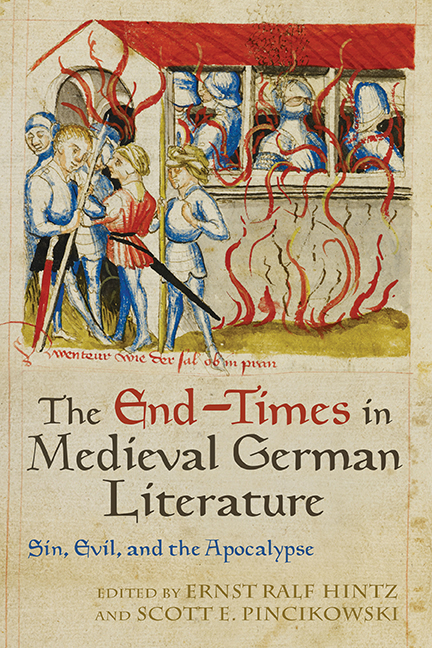Book contents
- Frontmatter
- Dedication
- Contents
- Acknowledgments
- Introduction
- 1 Thiu wirsa giburd: Cain’s Legacy, Original Sin, and the End of the World in the Old Saxon Genesis
- 2 The Heliand Revisited: Spiritual Transgendering and the Defiance of Evil
- 3 The Beginning of the End: Binary Dynamics and Initiative in Hartmann von Aue’s Gregorius
- 4 Poetic Reflections in Medieval German Literature on Tragic Conflicts, Massive Death, and Armageddon
- 5 Beyond Good and Evil: Apocalyptic Vision without Judgment in the Nibelungenlied. An Essay
- 6 End-Times in the Hall: The Modern Reception of the Apocalyptic Ending of the Nibelungenlied
- 7 Past Present, Future Present? Visualizing Arthurian Romance and the Beholder’s Share in a World That Refuses to End
- 8 Ich diene und wirbe / biz ich gar verdirbe: Lovesickness, Apocalypse, and the End-Times in Mauritius von Craûn and Das Nibelungenlied
- 9 The Slippery Concept of Evil in Hartmann von Aue’s Erec and Iwein
- 10 Wigamur’s Lessons on the Complexity of Evil
- 11 The Miracles of the Antichrist
- 12 Monsters and Monstrosities in the Pamphlet Wars of the Reformation
- Notes on the Contributors
- Index
5 - Beyond Good and Evil: Apocalyptic Vision without Judgment in the Nibelungenlied. An Essay
Published online by Cambridge University Press: 21 March 2020
- Frontmatter
- Dedication
- Contents
- Acknowledgments
- Introduction
- 1 Thiu wirsa giburd: Cain’s Legacy, Original Sin, and the End of the World in the Old Saxon Genesis
- 2 The Heliand Revisited: Spiritual Transgendering and the Defiance of Evil
- 3 The Beginning of the End: Binary Dynamics and Initiative in Hartmann von Aue’s Gregorius
- 4 Poetic Reflections in Medieval German Literature on Tragic Conflicts, Massive Death, and Armageddon
- 5 Beyond Good and Evil: Apocalyptic Vision without Judgment in the Nibelungenlied. An Essay
- 6 End-Times in the Hall: The Modern Reception of the Apocalyptic Ending of the Nibelungenlied
- 7 Past Present, Future Present? Visualizing Arthurian Romance and the Beholder’s Share in a World That Refuses to End
- 8 Ich diene und wirbe / biz ich gar verdirbe: Lovesickness, Apocalypse, and the End-Times in Mauritius von Craûn and Das Nibelungenlied
- 9 The Slippery Concept of Evil in Hartmann von Aue’s Erec and Iwein
- 10 Wigamur’s Lessons on the Complexity of Evil
- 11 The Miracles of the Antichrist
- 12 Monsters and Monstrosities in the Pamphlet Wars of the Reformation
- Notes on the Contributors
- Index
Summary
IN THE FIFTEENTH Âventiure of the post-Nibelungenlied epic, Kudrun, the heroine of the same name, daughter of the Hegeling monarchs Hetel and Hilde, is kidnapped by a jilted suitor, Hartmut of Ormanie, despite the fact that Kudrun has become engaged to Herwig of Seeland. Hetel and Herwig, supported by yet a third—albeit equally unsuccessful—suitor and hitherto adversary of Hetel, Siegfried von Morland, set off in pursuit of Kudrun. While Hetel tends to appear at this juncture as the somewhat hapless sovereign and father-protector, his old “Haudegen” (warhorse), Wate, emerges as the de facto leader of the Hegeling force. Wate knows “‘ir rehte wazzerstrâze’” (“the sea-route they [the Normans] will have to take”) and responds promptly to Hetel's query, “‘wâ solte ich hie kiele hân?’” (837, 1; “Where can I find ships here?”):
… “sîn mac wol werden rât.
got tuot mit gewalte † als ez umbe in stât. †
jâ weiz ich hie vil nâhen bî uns in dem lande
wol sibenzic guoter kiele; die stênt mit guoter spîse ûf einem sande.
Die hânt pilgerîne gefüeret ûf den sê.
die müezen wir gewinnen, swie ez uns dar nâch ergê.
si suln gedulticlîchen ûf dem sande erbîten,
unz wir mit unsern vînden uns versüenen oder … gestrîten.” (838–39)
[“There may be a solution to this, for God acts in powerful ways, as is his nature. I know that seventy ships can be found in this country. They are on a beach not far from here and are full of provisions. They are being used by pilgrims in their journey across the sea. We must requisition them, regardless of the consequences. The pilgrims will just have to wait patiently on the beach until we have either made peace with our enemies or (defeated them) in battle.”]
The Hegelings, particularly Wate (but he is not alone), display a remarkable degree of callousness toward the three thousand pilgrims, whose ships, along with more than five hundred of their number, are requisitioned. As Wate states, “‘swie ez uns dar nâch ergê’” (“whatever may subsequently befall us”/“regardless of the consequences”), they have to procure the ships. He appears to employ some deception when encountering the pilgrims, intimating that he (only) wishes to purchase any provisions they might be ready to sell (840, 3).
- Type
- Chapter
- Information
- The End-Times in Medieval German LiteratureSin, Evil, and the Apocalypse, pp. 98 - 119Publisher: Boydell & BrewerPrint publication year: 2019

